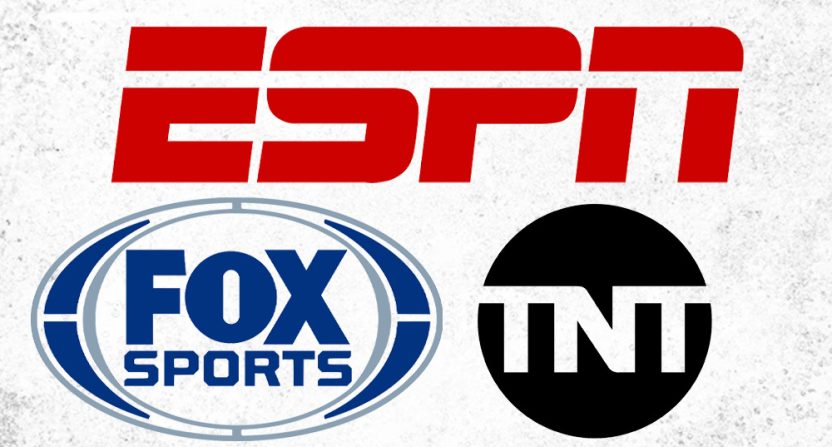News yesterday that FuboTV filed a lawsuit against the three media companies planning a sports streaming service is likely the first antitrust shoe to drop. But experts Awful Announcing spoke to were dubious of the prognosis for challenges to the as of yet-to-be-named service.
That’s partly because the plans and organization of the new streamer have not been disclosed since news first broke on February 6 of the potentially media shattering venture. But it’s also because the country’s antitrust laws are focused on what is pro- and anti-consumer, and the new streaming service offers a new option.
“This is pro-competitive, because we’re creating a new thing that gives consumers more choice,’” said sports antitrust attorney Jim Quinn, summarizing the argument of Fox Sports, Walt Disney (ESPN) and Warner Bros. Discovery (Turner, TNT). “Consumer choices is a factor, a significant factor that courts and the government look to, to see whether or not something is anti- or pro-competitive. In fact, the public consumers are benefiting because now if they want, no one forces them to do it, because they can get some of this elsewhere. But if for convenience sake or otherwise, the consumer chooses this new package, now that’s good. That’s good for the consumer. And it’s good for everybody. That’s the argument.”
Asked whether it is a good argument, Quinn, who oversaw the antitrust challenge to the NFL that led to free agency, said it certainly isn’t “frivolous.”
Sports attorney Chris Deubert agreed, saying he had a hard time finding the antitrust issue.
“It’s a win for consumers, which is primarily what the antitrust laws are concerned with. It’s another option, no one has to buy it, it shouldn’t negatively affect their pricing, the amount of our cable bill or anything else? I’m struggling to see where it would be bad.”
Obviously Fubo calls it bad. A lot of Fubo’s complaint is focused on past actions, the practice of the three companies forcing Fubo to take scores of unwanted channels in order to show the sports. Of course this is par for the course in the cable business (Fubo is a virtual cable provider), with the major linear broadcasters of sports also owning many non sports channels. Disney packages ESPN with the Disney channel, Fox Sports comes with Fox Business, and Comcast groups NBC with USA.
“For decades, Defendants have leveraged their iron grip on sports content to extract billions of dollars in supra-competitive profits; by engaging in practices causing consumers to pay more for highly popular sports content and resulting in significant damages to both Fubo and its customers,” Fubo said in a statement. The three companies forced “Fubo to carry dozens of expensive non-sports channels that Fubo’s customers do not want as a condition of licensing the Defendants’ sports channels.”
There is some irony in this. Back in the day the complaint about bundled cable was that non-sports fans were subsidizing sports. Channels get subscriber fees from cable operators for every subscriber. Now Fubo is saying its customers who just want sports have been forced to subsidize non=sports.
So one can imagine Fubo’s reaction when Fox, ESPN and Discovery announced the pooled steaming venture, creating what Fubo wanted all along.
“The complaint alleges that the forthcoming launch of a sports-streaming joint venture steals Fubo’s playbook,” Fubo said in a press release.
There are four categories that could spawn potential antitrust lawsuits: the cable operators–and Fubo as a virtual one is first out the door; consumers; the content licensors, i.e. the leagues; and the government.
Reports already indicate the Justice Department will likely look at this. But the three companies are sure to respond: they are still competing against each other in other ways, whether for sports rights or viewers on other mediums. And again, the DOJ is primarily worried about the consumer.
“”The antitrust laws are concerned with whether there’s a pro-competitive justification for a combination among what might be competitors,” Deubert said. “And the media companies involved here have a pretty good response, which is, they’re literally creating a new product for which there is, I think survey evidence would show there’s pretty good demand. They’re trying to meet an unmet demand, right? People have cut the cord, but still want to watch live sports. And they’re probably frustrated by their inability to do that, or the requirements that they have to buy a whole bunch of individual subscription packages.”
The leagues were upset because they were blindsided by the news, but right now, it’s pure speculation these three companies will conspire to keep rights fees down. Take ESPN; it still needs sports for the linear channels, and its coming direct-to-consumer offering. There are also many more bidders for rights: CBS, NBC, Amazon, Apple, Google, and over the air networks.
Atlanta Falcons owner Arthur Blank told Front Office Sports recently, ““There’s plenty of competition for the NFL’s media rights. If you reduce it to such a small number then you don’t have quite the opportunity—but I don’t think the league is worried about that at this point.”
As for Fubo’s lawsuit, Quinn is skeptical. “I’m not sure exactly what standing Fubo might have. They are going to have to say that somehow they’re being harmed as a result of this proposed joint venture. It doesn’t immediately come to mind how they are harmed, but I guess, arguably, they’re going to say that this new venture will compete with them, it will hurt their business. Bottom line, that’s what they’re going to say.”







